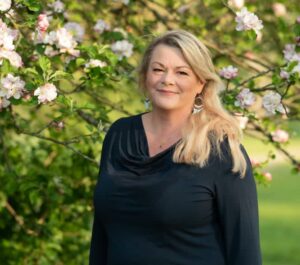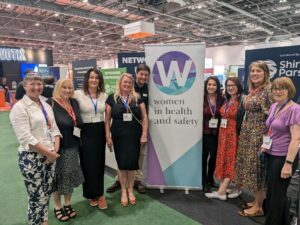Ahead of EHS Congress, taking place at the Estrel Congress Center in Berlin in May, SHP catches up with a key influencer in the health and safety sector – Heather Beach. As Managing Director of The Healthy Work Company she has worked with many organisations to train them in the importance of psychological safety, and tells us about the key to a thriving work culture.
SHP: Tell us a little about your background and how you got into safety?

Heather Beach, Founder of the Healthy Work Company
Heather Beach (HB): I’m not a traditional safety professional. I have actually never operated as a health and safety professional myself, but I have always run businesses in the health and safety sector. Aged 22, I was running the first database of all the information from the Health and Safety Executive (HSE) on a CD-ROM in full text, at the time no one had any access to this information elsewhere.
Since then I have basically been running businesses in the health and safety sector my whole career. Six years ago I decided I’ve done a lot for other people’s businesses, so I set my own business up and I started a master’s degree in applied positive psychology and I’ve been working with businesses to support their wellbeing strategy through training and consultancy ever since.
I’ve found that without diversity and inclusion, psychological safety is impacted.
If people don’t feel safe to speak up or share their experiences, they can feel isolated, marginalised, they will be less engaged and less safe. That’s why it matters.
SHP: What is the difference between wellness and wellbeing?
HB: I think wellness is generally individual and implies self care whereas well-being can be individual or organisational.
Organisational wellbeing is where I really sit and that’s creating the right conditions for people to thrive at work and that may be providing them with physical health initiatives.
It may well be providing them with training, but that training should support systemic changes. Is this a culture in which I can stand up and say ‘I’m actually too tired to operate this forklift truck today, I’m going to be dangerous if I do so?’ Or is it a culture based on performance at all costs and it doesn’t matter whether I’m tired or stressed or anxious or depressed. ‘I have to get out there and perform?’
SHP: One of your key objectives is to enable thriving cultures – what do you believe are the top three ways we can do this?
 HB: Number one is training your leaders to understand the impact they have and the culture they are creating.
HB: Number one is training your leaders to understand the impact they have and the culture they are creating.
Leadership and management are responsible for setting the tone for culture. So for example, are they an organisation that says you have to work around the clock to work here, that’s just the way it goes? Or do they take the time to actually consider that you need to flex your days?
The second thing is training your managers to manage. A lot of them were hired or promoted because they’re very good at the job, not because they are very good at managing people, empathetic or caring. If an organisation doesn’t train their managers then forget it, because people won’t go to their managers with a problem.
Most of what I do is tailored manager training, wellbeing conversations for managers to train them to have those good conversations and also to train them in understanding how they’re causing stress to their teams. It’s a constant journey of self-awareness and self regulation and we need to encourage managers to be doing so.
The third one is to do an organisational psychosocial risk assessment. You could call it a stress risk assessment.
The HSE actually requires you by law to do a stress risk assessment, but nobody does it because it’s not enforced. You’re far better to look at ISO 45003, which is a psychosocial risk assessment because it looks at more factors. The HSE stress risk assessment only looks at six factors and that doesn’t include things like fair pay, bullying and diversity and inclusion – whereas psychosocial risk assessment 45,003 does include all of that.
SHP: You’ve been described as a key influencer in the health and safety sector and as we know, founded Women in Health and Safety. How important is diversity in the industry and the role of women?
HB: When I started Women in Health and Safety, it was 2015 and we had just done a survey with SHP that showed that 29% of the profession were female. I thought, where are they? Because you don’t see them at events, networking or on stage – but women didn’t feel those events were the kind of place where their face fitted. Generally the demographic was older white men on their third or fourth career who’d come from the police or the army or engineering – and the women were very different.
But there’s benefits to having more women in the profession, the first is it encourages more diversity in general, because if you can see it, you can be it. So if you can see women in leadership positions, at events doing these things, you realise that this is a career that could be for me.
The second thing is that it creates a level of comfort for those people that are in the workforce, who perhaps are female, or perhaps would have felt more comfortable dealing with a woman, and now they have that option.
And the third thing is that the research shows – and the latest research was actually published in 2022 – that wherever you go in the world, women score higher on empathy and emotional intelligence. And that is a key skill for a health and safety professional in the main – not every type of health and safety professional of course, there are other skills also needed, we need a diverse pool of skills.
Watch Heather and a panel of guest speakers discuss women in fire, safety and security in our on-demand webinar here!
SHP: How do you think the view of wellbeing has changed in the last three years and what impact has this had on your work?
HB: Everybody has been talking about it but they are confused as to what they need to do now. People jumped on the latest initiative, mental health first aid was incredibly popular and that was how you showed that you were committed.
It’s done some good work because it has enabled conversations, but people are now confused because they’ve put mental health first aid in place, they’ve got an employee assistance programme, they’ve got some occupational health, and their sickness absence is higher than ever. So what’s happening?
With COVID and then the cost of living crisis, the background against which we’re operating is not conducive to good wellbeing. However, what we’re doing in organisations is not working either. What I’m finding is that organisations are now coming to us with a much more open mindset – what do we do? As opposed to ‘give me some mental health first aid’ or ‘give me some mental health awareness training’. People are understanding that actually they do need to look systemically. Like any other health and safety topic, you should be looking at designing out your risk, not training people to deal with your risk better.
SHP: What are you most looking forward to about attending EHS Congress, in Berlin, in May?
 HB: I’m most looking forward to catching up with people I already know and meeting new people who are doing great things. This Congress, in the past, has been quite academic in terms of ‘this is what you do’ and ‘this is the way we operate’ – but what I’ve seen of the programme this year, it’s become much more practical in terms of application, that’s what I’m interested in, how you apply these principles.
HB: I’m most looking forward to catching up with people I already know and meeting new people who are doing great things. This Congress, in the past, has been quite academic in terms of ‘this is what you do’ and ‘this is the way we operate’ – but what I’ve seen of the programme this year, it’s become much more practical in terms of application, that’s what I’m interested in, how you apply these principles.
SHP: You’ll be speaking at EHS Congress too, what can delegates expect from your session?
HB: I think they can expect to be challenged. I’ve got three brilliant women on my panel, all of whom have very different backgrounds, very different approaches.
One of the topics we will talk about is how we ensure that we bring men on the journey with us, that we create male allies and that they don’t see women being involved in the profession at a senior level as a threat.
In general, there are fewer thought leaders in health and safety that are women – they may not be able to or interested in going round the world speaking at events and I think that’s a very interesting point. Systemically women are still taking the burden of the cognitive load of the house and the children, and they may willingly want to do that as well. So it’s looking at other ways that women can be influential, not just speaking in public, not just writing books, but doing other things.
SHP: How important is it for the profession to come together like this and share best practice?
HB: During the pandemic, I thought face to face events will never happen again and I will never go to one again. And then in September last year, I went to the EHS Congress for the first time – I was persuaded at the last minute to go – and it was so brilliant for me because it really set my brain firing again.
What I noticed last year was that it was very ‘safety’ and there wasn’t any thinking about how wellbeing impacts on safety. If you’re in the wrong frame of mind, if you’re frustrated, stressed, anxious, depressed… you are not going to be safe and that wasn’t even a topic that was examined. But in the coffee breaks with various people who were taking me through their safety strategies, it was amazing and energizing, you can really learn and it sparks ideas. It’s the best way of building relationships. Yes, I could do it on Teams or Zoom, but seeing people in the flesh is the best way of doing it.
Hear more from Heather Beach at the 2023 EHS Congress, taking place in Berlin from 24-25 May.
Click to register for your place and to see the full EHS Congress agenda.
Click here for more from EHS Congress on SHP.
Click here for more information on the Healthy Work Company.
The Safety Conversation Podcast: Listen now!
The Safety Conversation with SHP (previously the Safety and Health Podcast) aims to bring you the latest news, insights and legislation updates in the form of interviews, discussions and panel debates from leading figures within the profession.
Find us on Apple Podcasts, Spotify and Google Podcasts, subscribe and join the conversation today!


 HB: Number one is training your leaders to understand the impact they have and the culture they are creating.
HB: Number one is training your leaders to understand the impact they have and the culture they are creating. 
 HB: I’m most looking forward to catching up with people I already know and meeting new people who are doing great things. This Congress, in the past, has been quite academic in terms of ‘this is what you do’ and ‘this is the way we operate’ – but what I’ve seen of the programme this year, it’s become much more practical in terms of application, that’s what I’m interested in, how you apply these principles.
HB: I’m most looking forward to catching up with people I already know and meeting new people who are doing great things. This Congress, in the past, has been quite academic in terms of ‘this is what you do’ and ‘this is the way we operate’ – but what I’ve seen of the programme this year, it’s become much more practical in terms of application, that’s what I’m interested in, how you apply these principles.
“If you’re in the wrong frame of mind, if you’re frustrated, stressed, anxious, depressed… you are not going to be safe”
I could not agree more!